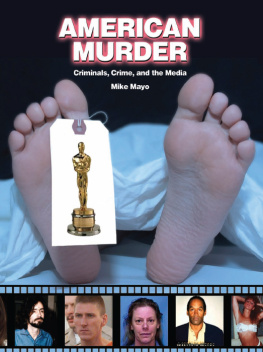P seudonyms have been used to protect the identities of various individuals mentioned in this book where warranted or deemed appropriate in the circumstances. Any name that appears in quotation marks the first time it appears in the book is a pseudonym and not the real name of the person so identified.
W hat is it about dumb criminals that is so endlessly entertaining? Perhaps it starts with the criminality. Criminals are bad, and everyone is fascinated by bad men and women. Witness the appeal of such badly flawed characters as Cleopatra, Grendel, Jack the Ripper, Jesse James, Catherine the Great, Rasputin and Charles Manson. (Some might be tempted to add Donald Trump to this list, but history will have the final word on him.)
Then theres the dumbness. It is always amusing to see or hear about other peoples blunders, whether through faulty planning or clumsy execution. Thats why Wile E. Coyote never catches the Road Runner. Thats why Kevin McCallister always foils those burglars.
So dumb criminals make for perfect light reading. When a hero fails, its tragedy, but when a criminal fails, its comedy, a relief, plus someone getting their just deserts. You dont need to feel sad or guilty or anything except amused when a bad guy flops, and you can throw in a bit of moral superiority if you need to.
So here you go. Amuse yourself with a selection of flops, fails and fiascos from around the world. Most of the time, the criminals involved deserve to be laughed at, and they always deserve to fail.
NICKELED AND DIMED
T here was obviously very little brain power put into planning this robbery. Either that or the getaway driver put so much brain power into it that it tired him out. One way or another, police found him asleep outside the bank in question.
Lets start at the beginning. On a Sunday morning in June 2017, three men decided to rob a bank. The plan, as far as anyone can tell, was to go as follows: two of the men would break into a Wachovia bank in South Beach, Florida, and the third member of the gang would wait behind the wheel of the getaway car.
According to NBC 6, the two got into the bank by smashing the window at 5:45 a.m. on a Sunday. The bank, of course, was closed, and all the cash was locked in the vault. It appears the men did not have the foresight to realize that this would be the case. So after finding out that all the cash was locked away, they decided to improvise, taking all the quarters, dimes and nickels they could carry. Turns out, they couldnt handle as many as they thought they could. They filled some bags and headed for the car, but the coins weighed them down so much they were easily caught by the police.
Meanwhile, their getaway driver had fallen asleep, drunk, behind the wheel, and even slept through the sirens and the arrival of the cops.
CALLING AHEAD FOR TAKEOUT
T wo would-be bank robbers tried phoning in a heist, presumably to increase efficiency and their chances of success, according to Connecticut police. Not surprisingly, their plan backfired.
Ive heard of drive-up robberies where they rob the bank via drive-up windows, said Detective Lieutenant Michael Gagner of the Fairfield Police Department. But Ive never had somebody call ahead and say, Get the money, were coming.
The attempted bank job occurred in March 2010 at a branch of the Peoples Bank in Fairfield. According to a CNN report, a bank employee received a phone call from one of the suspects demanding that $100,000 in large bills be gathered. The suspect threatened that there would be a blood bath if their demands were not met.
The employee immediately called 911, Gagner reported. The bank also initiated a lockdown; however, one of the robbers was already inside. While his co-conspirator was on the phone with one teller, he had entered the bank and handed another teller a note demanding money. The [employee] is literally giving us a blow-by-blow, saying the robbery is going down, Gagner said.
The suspect in the bank was able to take around $900, but by the time he asked employees to open the door for him to leave, police had arrived at the scene. The suspect ignored the officers orders to stop and ran to a nearby car, where his partner was waiting. Police were then able to arrest both suspects without incident.
As reported by the Fairfield Citizen, a search by police of the suspects vehicle produced a scanner tuned to the Fairfield police frequency, two walkie-talkies and a robbery to-do list that included times for getting into and out of the bank.
We were all kind of cracking up with the call-ahead aspect of it, Gagner said. Definitely unusual technique.
Gagner added that the robbers had insisted that a dye pack not be put in with the money waiting for them. The bank disregarded this order, and a bag of cash got covered in dye when it was thrown on the ground.
One of the suspects was a twenty-seven-year-old man, Arnold, from Bridgeport, Connecticut. The other was his sixteen-year-old cousin, who was considered a juvenile. The two were charged with first-degree robbery and threatening in the first degree.
In October 2010, Arnold pleaded guilty in Connecticut State Superior Court to conspiracy to commit second-degree robbery, being a persistent dangerous felony offender and harassment.
Arnold was on probation at the time, having served seven years for another bank holdup in July 2003. According to prosecutor Howard Stein, Arnold had walked into a bank and handed the teller a note demanding $50,000 in cash, saying that he had a bomb. Upon leaving the bank, Arnold was immediately arrested. Police found a circuit board and some wires in his pocket, Stein said. Arnold told police he had been kidnapped by a man who said he was putting a bomb in Arnolds pocket and threatened to detonate it unless he robbed the bank for him. Despite this story, Arnold ended up pleading guilty to that robbery too.
A FAMILY AFFAIR
R oland was a widower who had a problem with alcohol and a pile of bills. He also had two kids. So he did what most struggling dads do when they are trying to support their families: he got a handgun and held up a bank.
According to police reports, after that first successful bank robbery, every year or so, Roland would visit a bank and steal a few thousand dollars. It paid the bills.
After robbing five banks, Roland moved from Oregon to Texas, and his twenty-year-old son, Dean, and eighteen-year-old daughter, Bibi, soon followed. Roland wanted to start a gang, so he asked his kids to help out. Dean needed money for college, so he was willing. Bibi also agreed, but mostly just to please her dad.
According to HuffPost, the family robbed their first bank, in Katy, Texas, in August 2012. Roland and Dean wore painters masks and overalls, and carried pellet guns. Bibi parked behind the building and waited for them, keeping in touch by phone.
The robbery netted nearly $70,000. A few months later, they pulled a second job, but this time they made a mistake when they tried to case the bank in advance. Wearing orange safety vests, they pretended to be construction workers who wanted to open accounts. After the robbery, detectives viewing the security videos thought the vests were too clean to belong to real construction workers. Oxygen reported that the police tracked the vests to a local hardware store and got Rolands credit card information. They busted the family in November.
As reported by ABC News, the robbers immediately confessed. Because Bibi was merely the getaway driver, and under duress, she was sentenced to five years. Dean was given a ten-year sentence, and Roland, who also confessed to several robberies in Oregon, got twenty-four years.













